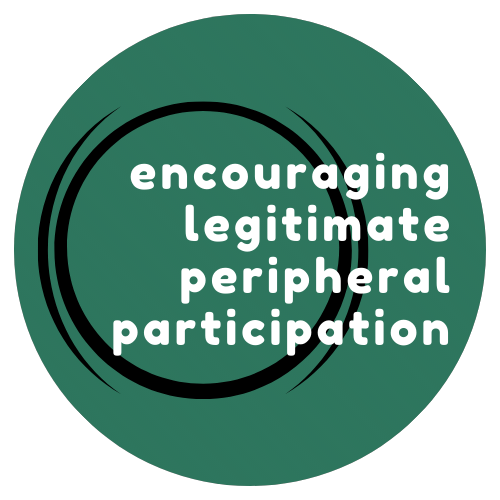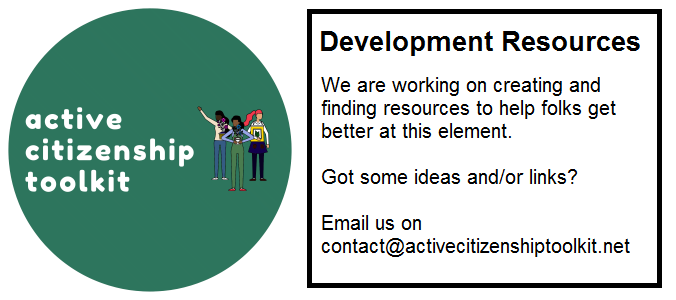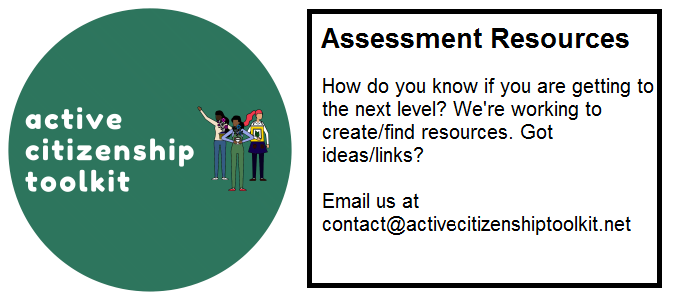Element Descriptor

If people have to regularly come to long meetings to find out what they can contribute to a group they won’t – either attend or contribute. And their skills, time, ideas are lost. And everyone is demoralised. Therefore, figuring out ways people can legitimately (with both approval and recognition) participate in a group’s work, without EFMs, is crucial. (Overlaps with maintaining list of jobs and tasks, and volunteer management, obviously).
Level descriptors
| Novice | Practitioner | Expert | Ninja |
|---|---|---|---|
| You are able to find ways for a small number of formerly activist, highly motivated and well-resourced individuals to contribute to clearly defined projects within a predictable strategy of a group, using well-tested techniques. | You are able to find ways for significant numbers of people, including those who have never done this before and neither consider themselves ‘activists’ or would ever want to be seen as such, to bring their various talents to a project or two, with different levels of availability, commitment and resources. | You are able to help large numbers of people from all levels of experience, motivation and capacity to contribute to a variety of projects, some of which are tricky to explain and/or relatively amorphous/illegal/immoral/fattening. You are able to help people see what will ‘work’ for them as individuals, and be realistic and proactive about lunchoutism, using existing techniques but also creating and honing new methods. | You can effortlessly and quickly build a swarm from a rabble, with clear, funny, engaging and capacity-building techniques that not only get the job done on mission-critical and smoke-monster-clarity projects, but also both raise LPP people’s skill levels and confidence levels, but also connect them in GDPR compliant ways to other folks they would never have met. Without breaking a sweat or rolling so much as an eye. |
Element Overview Essay
This is a draft. If something doesn’t make sense, or you see typos, or if you have further ideas, please email us on contact@activecitizenshiptoolkit.net
There are two main reasons why enabling Legitimate Peripheral Participation – making it possible for people to be meaningfully engaged/involved without coming to endless meetings – is not done well or at all.
Number one, nobody wants to have a “walk-on part in the war”. They’d rather have a “lead role in a cage.” That is to say, people don’t want to say the following sentences, the following syllogism.
- Climate change is an existential threat.
- Governments are not doing enough.
- Therefore citizens have to act.
- However, I have bills to pay a mortgage, children to raise hobbies to keep up with boxsets of Game of Thrones, etc.
- And therefore, I’m only willing to give maybe an hour a week, two hours a month to a cause.
- Because instead, you know, I’ll just write a direct debit to Friends of the Earth and let them get on with it.
Nobody is gonna say that.
So if you start talking to people about them being involved just a little bit, even if that’s a little bit attractive to them, there is also the problem. It doesn’t really chime with their need – their understandable need – to feel good about themselves. There are of course, some people for whom the opportunity to be peripherally involved is something that they’re very up for if the task is right.
Okay. The flipside is that most campaigning groups don’t actually know what they’re trying to achieve or how they’re trying to achieve it. So they don’t have a detailed list of things that people can do for half an hour here, an hour there, 30 minutes there. That is part of the mosaic that builds up to something bigger. Yes, they do have short actions. But it’s mostly “click on this petition” or “share this consultation” or “write an email to your councillor, or MP.” None of those things is particularly engaging or using other people’s other skills and talents. And it doesn’t help those people understand what’s going on or become better at doing active citizenship, or being networked with other people on the whole.
So those are the two big sort of psychological and then systemic reasons why non hierarchical social movement organisations and hierarchical NGOs are mostly quite bad at enabling legitimate peripheral participation.
Another thing just comes to mind, of course, if you’re celebrating the fact that a bunch of people did 20 minutes work here and there, the people who are more engaged and more active, may have their noses out of joint and think “well if I can get the same prestige from doing less than I will.” Now, I think that’s quite a cynical view, and I’ve never seen it or felt it, but it’s worth bearing in mind.
Okay, so what are the consequences? What happens if you don’t enable legitimate peripheral participation? Well, number one thing is that your group stays limited to being only capable of doing the things that people who are in the core group capable of doing both in terms of the skills that those people have, but also the time, energy and motivation, morale that those people have.
And of course, groups often shrink over time, because people leave, they get a job in a different city. They get new caring responsibilities, that gets sick, they get burnt out, whatever.
So without the enabling of “legitimate peripheral participation” – and I do wish someone would come up with a better term – what you’re left with is a core group that does all the work and a bunch of other people observing and maybe applauding them from a distance.
So the other thing that does is it reinforces the narrative, that unless you can drop everything, – “come with me if you want to live” – then you’re not you don’t really count, you can’t be an active citizen, because the groups are all geared to heroic, burning out style, boom and bust approaches.
So, we’ve talked about the causes, or the reason that doesn’t happen. We’ve talked about the consequences. What are the solutions?
Well, it’s pretty straightforward. You do need to know what you as a group are trying to achieve and how you’re trying to achieve it. You need to break tasks down so that when you’re delegating a task or a problem you can explain to someone, what skills what elements are needed, what knowledge is needed, at what level you need to keep a public list regularly updated, of all the different jobs that made doing so that people can at their leisure, go and look at that list and a spreadsheet makes sense. And they can see the list and say, “oh, this group still needs x doing. I’ll drop them a line to make sure that they still need it. And then I’ll do it.”
And then of course, when they do that job, you and the core group, have to thank them. Give them any feedback on how they did it. Was it of the quality and needed and time and that’s obviously very sensitive if it’s someone who’s new to the game.
And, crucially, you need to make sure that you don’t even inadvertently, emotionally blackmail them into doing more and being sucked in to ever greater commitments. because number one, that’s just wrong. Number two, it doesn’t work with that individual probably. And number three, word gets round. “Don’t do small jobs for group x, because once you’ve done it, they’ll never stop hassling you to do slightly bigger jobs and slightly bigger jobs. They’re a god damn cult.” You don’t want that reputation. You really, really don’t.
See also listing jobs
See also volunteer management
Development Resources

Assessment Resources

